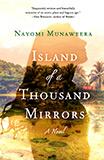Summary | Excerpt | Reading Guide | Discuss | Reviews | Beyond the Book | Readalikes | Genres & Themes | Author Bio

Farther out beyond the reef, where the coral gives way to the true deep, at a certain time of day a tribe of flat silver fish gather in their thousands. To be there is to be surrounded by living shards of light. At a secret signal, all is chaos, a thousand mirrors shattering about him. Then the school speeds to sea and the boy is left in sedate water, a tug and pull of the body as comfortable as sitting in his father's outspread sarong being sung to sleep.
When he emerges dripping from the sea, it is to find this father, the village Ayurvedic doctor, perched on an upturned catamaran, deep in conversation with the fisherfolk who squat on their heels before him.
The fishermen wear sarongs splotched with octopus ink. Their hands are leathered by handling rope, mending nets, wrestling sharks by their tails onto the beach. They are ruthless with the flesh of the creatures they catch, upturning gentle sea turtles in the sand to carve off chunks of the living flesh. The turtles bleed slowly, drip salt tears from the corners of their ancient eyes. In this way the meat stays fresh for days, the fishermen explain. For similar reasons the fishermen grasp just caught octopuses and turn them inside out, exposing delicate internals that flash through cycles of color. Decades later, in America, when my father sees Christmas lights for the first time, he will astound us with the observation that they look just like dying octopuses.
The sun drops fast, blazing momentarily crimson on the horizon. Father and son wander home. At the front door, his mother, Beatrice Muriel, waits, a lantern in her hand. In her other hand, she grips the shoulder of Nishan's twin sister, Mala, who by dint of her girlhood is not allowed on beach wanderings. Beatrice Muriel ignores her husband. She is angry that they have spent the day with the fisherfolk, listening to fisher songs, picking up fisher habits, coming home covered in beach sand. It is too dark to bathe, she scolds. Cold well water after the sun has set will result in sneezing and a runny nose. "Running here and there, like a savage. One day I will find you up a coconut tree with the toddy tappers. That's the day I will skin you alive. Wait and see if I don't."
As she scolds, she pulls the bones out of fried fish with deft fingers, mixes it with red rice and coconut sambal into balls, which she pops into the mouths of her children: a bird feeding its chicks. Her monologue ceases only when the plate is empty.
Afterward, he goes to sleep on the straw mat next to Mala, sea sand frosting his limbs and gritty in his hair and eyelashes, the dark shapes of his parents on either side of them, their breathing soothing him into sleep.
His mother, Beatrice Muriel, comes from a prominent southern family peopled with Vincents, Victorias, Annie- Henriettas, Elizabeths, and Herberts in tribute to the former ruling race. Now, after marriage to the Hikkaduwa Ayurvedic doctor, she is the village schoolteacher. In the small classroom, open to the sea breezes, she teaches the children to read, leads them as they chant loudly an English menagerie: "Q IS FOR QUAIL! R IS FOR ROBIN! S IS FOR ESQUIRREL!" In the sultry afternoons, she teaches them to work numbers so that they will not be cheated when the Colombo buyers come for fish.
Seven years before, Beatrice Muriel, at the age of sixteen, married for a year, finds herself bloodless and nauseous. Her new husband examines her tongue, pulls back her eyelids, nods his head, but propriety will not allow him to name her ailment. Three months later, as custom demands, he sends her home to her mother by swaying bullock cart.
In the ancestral house, she is fed and pampered, stroked and coddled. When the pains begin, she labors surrounded by the various women of her family. Her mother parts her thighs, whispers endearments and encouragements into her sweating ears.
Excerpted from Island of a Thousand Mirrors by Nayomi Munaweera. Copyright © 2014 by Nayomi Munaweera. Excerpted by permission of Thomas Dunne Books. All rights reserved. No part of this excerpt may be reproduced or reprinted without permission in writing from the publisher.
It is among the commonplaces of education that we often first cut off the living root and then try to replace its ...
Click Here to find out who said this, as well as discovering other famous literary quotes!
Your guide toexceptional books
BookBrowse seeks out and recommends the best in contemporary fiction and nonfiction—books that not only engage and entertain but also deepen our understanding of ourselves and the world around us.